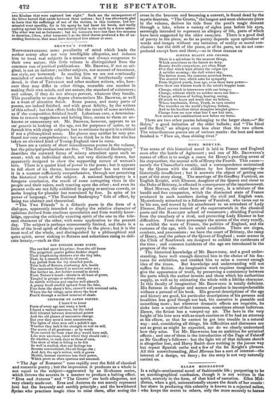HOEL MORVAN.
THE scene of this historical novel is laid in France and England soon after the battle of Agincourt ; and one of Mr. BROWNING'S means of effect is to assign a cause for Henry's puzzling arrest of his stepmother, the second wife of Henry the Fourth. This cause— merely the Chancellor's enmity, and a correspondence maintained by the Queen with the children by her former marriage—is historically insufficient ; but it answers the object of getting one part of the story along. The marriage of Sir Geoffrey Furnival, an English Knight, with Eleanor, daughter of the Queen and sister to the Duke of Brittany, is effected in consequence of the imprisonment. Hod l Morvan, the other hero of the story, is a mixture of the bandit and free companion, which the distracted state of France produced in such numbers during the civil and English wars. Mysteriously attracted to a follower of Furnival, who turns out to be his son, and moved by his attachment to an attendant of Lady Eleanor, Hoel serves instead of the supernaturals in the classical poets and the RADCLIFF school of romancers ; shielding Furnival from the treachery of a rival, and protecting Lady Eleanor in her difficulties. From these personages the scenes of the story ramify, to exhibit the wars of France, the politics of England, and the customs of the age, with its social condition. There are sieges, combats, and processions; we have the court of Brittany, the camp of Henry, and the palace of the Queen of England ; some scenes in the Clink of Southwark are designed to exhibit the cutthroats of the time ; and common incidents of the age are introduced in the progress of the tale. The historical knowledge of Mr. BROWNING, and a good under- standing, have well enough directed him in the choice of his fea- tures for exhibition, and enabled him to seize a correct enough idea of the times. But knowledge and understanding will not suffice for fiction. An imaginative work requires imagination to give the appearance of truth, by preserving a consistency between the parts which the author invents and those which his authorities supply, as well as by animating the whole with a lifelike character. In this faculty of imagination Mr. BROWNING is totally deficient. His flatness in dialogue and scenes of passion is incomprehensible without a perusal of his book. His general descriptions of the age and history are good, his particular descriptions of his persons and localities less good though not bad, his narrative is passable and something more ; but wherever dramatic effects are requisite, he sinks into a matter-of-fact tameness, sometimes almost ludicrous. Hence, the fiction has a vamped-up air. The hero in the very height of his love acts with as much caution as if he had an attorney at his elbow, so that he cannot be got into trouble in a natural way : and, considering all things, his difficulties and distresses are not so great as might be expected, nor do we clearly understand how they arise. Yet Mr. BROWNING has an ambition for artistica! effects ; and one of them is the introduction of the Page of Falstaff as Sir Geoffrey's follower : but the light wit of that delicate sketch is altogether lost, and Harry Smith does nothing in the jocose way but repeat Spanish oaths and a few of the fat Knight's phrases. All this notwithstanding, Hod Morvan has a sort of interest—the interest of a design, we fancy ; for the story is not very naturally carried on.


























 Previous page
Previous page